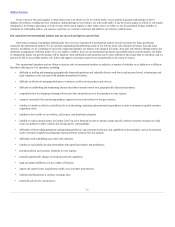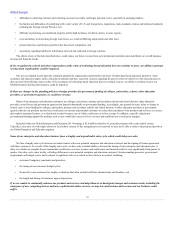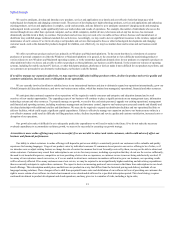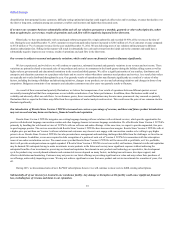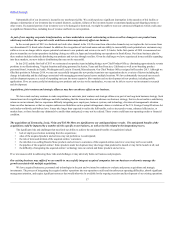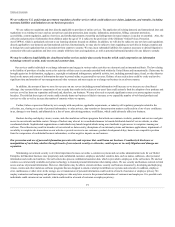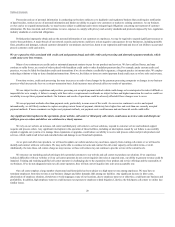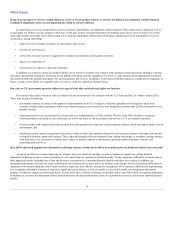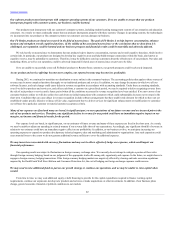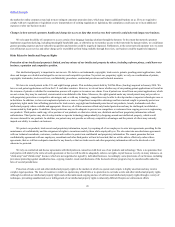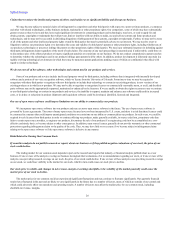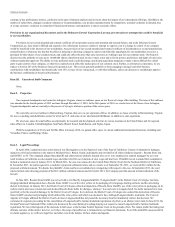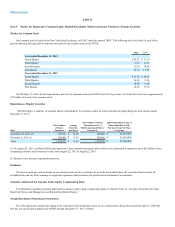Rosetta Stone 2013 Annual Report Download - page 24
Download and view the complete annual report
Please find page 24 of the 2013 Rosetta Stone annual report below. You can navigate through the pages in the report by either clicking on the pages listed below, or by using the keyword search tool below to find specific information within the annual report.
Table of Contents
change, or other circumstances arise that have a material effect on our cash flow, the anticipated cash needs of our business as well as our conclusions as to
the adequacy of our available sources of capital could change significantly. Any of these events or circumstances could result in significant additional funding
needs, requiring us to raise additional capital. We cannot predict the timing or amount of any such capital requirements at this time. If financing is not
available on satisfactory terms, or at all, we may be unable to expand our business or to develop new business at the rate desired and our results of operations
may suffer.
Changes in applicable accounting principles could negatively affect our financial performance.
Our financial statements are prepared in accordance with accounting principles generally accepted in the U.S. ("GAAP") and are subject to interpretation
by the SEC and the Financial Accounting Standards Board ("FASB"). A change in GAAP or interpretations of GAAP may have a negative effect on our
reported financial results and even retroactively affect previously reported results. The FASB is currently working together with the International Accounting
Standards Board ("IASB") on several projects to align accounting principles internationally. These efforts by the FASB and IASB could change the
accounting principles applicable to us and result in materially worse financial results for us in areas including, but not limited to, principles for recognizing
revenue.
If our goodwill or indefinite-lived intangible assets become impaired, we may be required to record a significant charge to earnings.
Under GAAP, we review our goodwill and indefinite lived intangible assets for impairment at least annually and when there are changes in
circumstances. Factors that may be considered a change in circumstances include a decline in stock price and market capitalization, future cash flows and
slower growth rates in our industry. We may therefore be required to record a significant charge to earnings in our financial statements during the period in
which any impairment of our goodwill or indefinite lived intangible assets is determined, resulting in a negative effect on our results of operations.
Changes in, or interpretations of, tax rules and regulations may adversely affect our effective tax rates.
We are subject to tax in multiple U.S. and foreign tax jurisdictions. If certain foreign earnings previously treated as permanently reinvested are
repatriated, the related U.S. tax liability may be reduced by any foreign income taxes paid on these earnings. Unanticipated changes in our tax rates could
affect our future results of operations. Our future effective tax rates could be unfavorably affected by changes in the tax rates in jurisdictions where our income
is earned or by changes in the valuation of our deferred tax assets and liabilities.
Our investment portfolio may become impaired by deterioration of the capital markets.
We follow an established investment policy and set of guidelines to monitor and help mitigate our exposure to interest rate and credit risk. The policy sets
forth credit quality standards and limits our exposure to any one issuer, as well as our maximum exposure to various asset classes. As of December 31, 2013,
our cash consisted of highly liquid investments with original maturities of three months or less and demand deposits with financial institutions. If financial
market conditions worsen in the future, investments in some financial instruments may suffer from market liquidity and credit problems. We cannot predict
future market conditions or market liquidity, or credit availability, and can provide no assurance that our investment portfolio will remain materially
unimpaired.
Catastrophic events may disrupt our business and may not be manageable under our Crisis Management Policy.
We rely on our network infrastructure and enterprise applications, internal technology systems and our website for our development, marketing,
operational, support, hosted services and sales activities. A disruption, infiltration or failure of these systems or third-party hosted services that we rely on for
some of our business systems could, in the event of a major earthquake, fire, flood, power loss, telecommunications failure, software or hardware
malfunctions, cyber-attack, war, terrorist attack or other catastrophic event, cause system interruptions, reputational harm, loss of intellectual property,
delays in our product development, lengthy interruptions in our services, breaches of data security and loss of critical data and could prevent us from
fulfilling our customers' orders. We have developed certain disaster recovery plans and backup systems to reduce the potentially adverse effect of such events,
but a catastrophic event that results in the destruction or disruption of any of our data centers or our critical business or information technology systems could
severely affect our ability to conduct normal business operations and, as a result, our future operating results could be adversely affected.
If government regulations relating to the Internet or other areas of our business change, we may need to alter the manner in which we conduct
our business, or incur greater operating expenses.
The adoption or modification of laws or regulations relating to the Internet or other areas of our business could limit or otherwise adversely affect the
manner in which we currently conduct our business. In addition, the growth and development of
23


